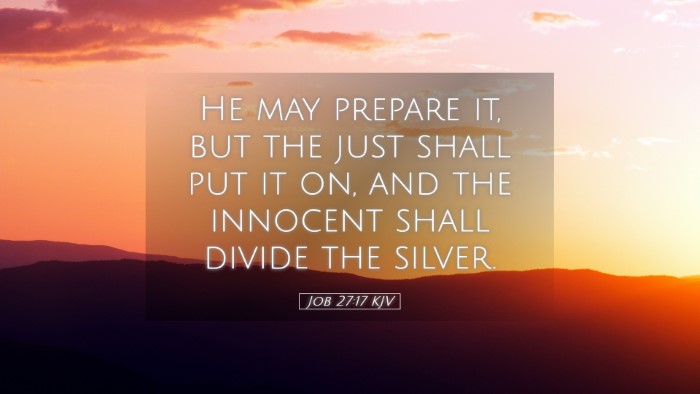Old Testament
Genesis Exodus Leviticus Numbers Deuteronomy Joshua Judges Ruth 1 Samuel 2 Samuel 1 Kings 2 Kings 1 Chronicles 2 Chronicles Ezra Nehemiah Esther Job Psalms Proverbs Ecclesiastes Song of Solomon Isaiah Jeremiah Lamentations Ezekiel Daniel Hosea Joel Amos Obadiah Jonah Micah Nahum Habakkuk Zephaniah Haggai Zechariah MalachiJob 27:17
Job 27:17 KJV
He may prepare it, but the just shall put it on, and the innocent shall divide the silver.
Job 27:17 Bible Commentary
Commentary on Job 27:17
Verse Context: The book of Job is a poetic exploration of suffering, faith, and divine justice. Job, a righteous man, faces immense trials and engages in dialogues about the nature of suffering and God's sovereignty. Job 27:17 states, "He may prepare it, but the just shall put it on, and the innocent shall divide the silver." This verse underscores themes of justice, integrity, and the ultimate fate of the wicked versus the righteous.
Historical Background
The Book of Job is one of the oldest texts in the Bible, set in the land of Uz. Job is depicted as a wealthy and upright man whose life is turned upside down due to a heavenly wager between God and Satan. This context raises questions about theodicy, human righteousness, and divine governance.
Insight from Matthew Henry
Matthew Henry’s commentary highlights the paradox of wealth and morality. In this verse, Job emphasizes that while the wicked may amass wealth, it ultimately falls to the just. Henry notes that this serves as a comfort to the righteous, affirming their eventual inheritance, regardless of their current plight. He argues that Job's assertion reflects a profound truth: that riches do not define one's eternal destiny. Instead, integrity and faithfulness lead to a promised reward.
Insights from Albert Barnes
Albert Barnes focuses on the broader themes of divine justice in this passage. He expresses that the "just" will eventually inherit the wealth of the wicked, which supports the idea of divine retribution. Barnes points out that Job's declaration serves as a reminder of God’s ultimate control over the fortunes of men. He emphasizes that while the wicked may seem successful for a time, their downfall is inevitable, allowing the faithful to receive what rightfully belongs to them.
Insights from Adam Clarke
Adam Clarke expands the discourse by considering the socio-economic dynamics of the era. Clarke explains how Job's declaration illustrates the biblical principle that riches acquired through wickedness ultimately do not last. He elaborates that the “just” and “innocent” will be rightful beneficiaries of the wealth amassed by the ungodly. Clarke’s analysis points to the belief in a moral universe where ultimately, righteous behavior will lead to reward, whether in this life or the next.
Theological Implications
This verse raises significant theological implications regarding justice and providence. For pastors and theologians, it contributes to discussions about God’s sovereignty and human suffering. The assurance that righteousness will ultimately triumph provides comfort in the face of life’s injustices. Furthermore, it underscores the call for faithfulness and ethical living, reminding believers that earthly treasures are transient and do not equate with divine approval.
Application for Pastors and Theologians
- Encouragement: This verse serves as a source of encouragement for congregants experiencing trials. Pastors can remind their communities that their faithfulness will not go unnoticed by God, and His justice will prevail.
- Ethical Living: The commentary encourages a lifestyle of integrity. The teachings based on this verse can guide discussions about ethical decision-making in a world where success is often equated with financial gain, irrespective of the means.
- A Call to Trust: Pastors can use this passage to encourage a deepened trust in God's ultimate plan for justice, especially when faced with the apparent success of the ungodly.
Conclusion
Job 27:17 serves as a profound reminder of the transient nature of wealth and the enduring promise of reward for the righteous. Drawing from the insights of Matthew Henry, Albert Barnes, and Adam Clarke, it becomes clear that God's justice operates beyond human understanding and timing. The just shall ultimately inherit the earth and divide the blessings prepared for them, reinforcing the need for steadfastness in faith and righteousness.


